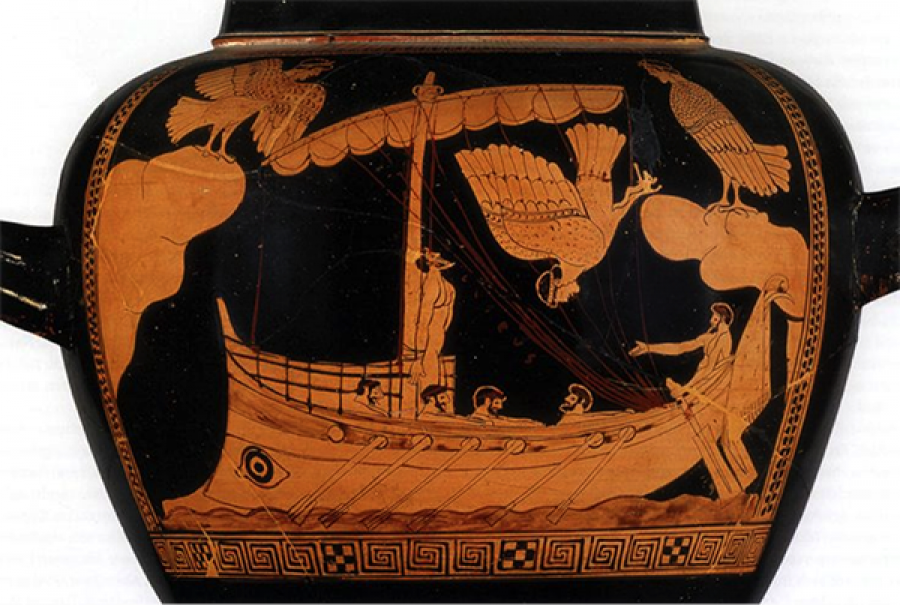"Odysseus, The Sirens, and a little bit of Rocky Horror"
Surely I am not alone in finding it a daunting task to pick one transformative “encounter with a particular work in the humanities" that has been significant for me personally or professionally. A month ago I managed to narrow it down to two choices: the Sirens episode in The Odyssey or The Rocky Horror Picture Show. In my ensuing agony of indecision I turned to my Facebook friends for guidance, and it turned out that many people “liked” my agony. But I was basically on my own to solve the dilemma.
Odysseus was a trickster, a rule breaker, and in the episode of the Sirens he games the system in order to listen to music that he really shouldn’t. So taking a lesson from Odysseus, I am going to start with a bit of the Rocky Horror Picture Show.
Between the ages of 16 and 18, this was my Sirens’ song—one that called me and many others to the weekly midnight screening of the Rocky Horror Picture Show at the Biograph Theater in Chicago. Back in the early 1980s the Rocky Horror experience was still a ritual of the queer fringe, a temporary and contained space for transgressions of gender, sexuality, and theater comportment. (For those of you unfamiliar with The Rocky Horror Picture Show, this was a 1975 movie that gained an urban cult following; audience members would dress up as characters, mime the action, talk back to the film with semi-standardized responses, and throw things at the screen). This song was particularly transfixing for me; something about the absurd soggy eroticism of the costumes and dance, the pathos of the shabby empty theater, and the call to wild abandon despite all.
The songs in Rocky Horror offered pearls of wisdom such as “don’t dream it, be it.” And that’s a perfectly fine transformative message; just what I needed to hear as a suburban queer teenager. But then there’s this equally compelling message: if you tie yourself up in the face of impossibly beautiful music sung by bird-women hybrids, then you'll be an epic hero.
I read The Odyssey in my first semester of college at the University of Chicago in a required humanities class that still bore the mark of the Great Books era of Chicago’s curriculum. My recollection of those days is that I was a good student who took copious notes; but looking at those notes recently, I found a lot of doodles and nothing on the Sirens episode. Nevertheless, that episode stuck with me through the next fifteen years and became foundational for my thinking about music. Like The Rocky Horror Picture Show, the Sirens episode tells of a music-infused quest for identity that is, well, kind of kinky. The story is this: Odysseus needs to sail home to Ithaca to reunite with his wife and family. Directly in his path are the Sirens whose singing so charms the listeners that they lose their wits and crash into the rocks. The smart thing to do is to sail around them or plug your ears, but Odysseus is seduced by the idea of being seduced by music. The sorceress Kirke tells him what to do: have your men tie you to the mast so you can listen while they row onward with their ears plugged. Odysseus’s volunteer bondage in order to listen to the Sirens’ song is told three more times: when Odysseus instructs his crew to bind him, when he narrates being bound up, and when he struggles to get free as he listens and his crew have to throw more rope around him. These repeated scenes of binding Odysseus’s body read like an erotic obsession, as well as reverberant shock at the transgression of that vision of a celebrated warrior turning himself into a captive slave.
What happens to us when we listen to music? What happens to our bodies and minds, to our sense of self, to our self in our social condition? What impresses me about this story is how it asks and answers these questions in succinct and visceral terms. Music—some, if not all in some way—causes the mind and body to struggle in unbearable desire. But what is that desire? What do we want when we are held captive by music?
Odysseus, like everyone who encountered the Sirens’ song, wanted to sail off course—the course that was leading him from being a warrior to being a husband, father, and ruler. I dare say that everyone who stood in line with me to see The Rocky Horror Picture Show wanted to sail off course too. In that first year of college, as I struggled with new demands of self-discipline, I felt I understood what the stakes were with the Sirens’ song: the ropes that bound Odysseus enacted the disciplining structures of family, duty, education, and common sense, just as the four walls of the movie theater safely contained the queer mayhem of the Rocky Horror ritual and kept most of us on our respectable paths. But the enduring lesson of the Sirens episode is the heroic submission to the temptation to question who we are and what we are doing. That questioning is embedded in the agony and ecstasy of listening to music, in our bodily and emotional responses that exceed the rational, and through which we are soothed, agitated, or transported.
The transformational pull of my encounter with the Sirens episode is a model case for this series of talks: from one text in a required humanities course I changed my intended major from psychology to music, went on to a PhD program in musicology, and wrote a book called Listening to the Sirens. I even ended up in a place called Ithaca. So perhaps mine is a cautionary tale about the power of the humanities: be careful what literature you read, art you see, or music you listen to, for it may alter the course of your life.





